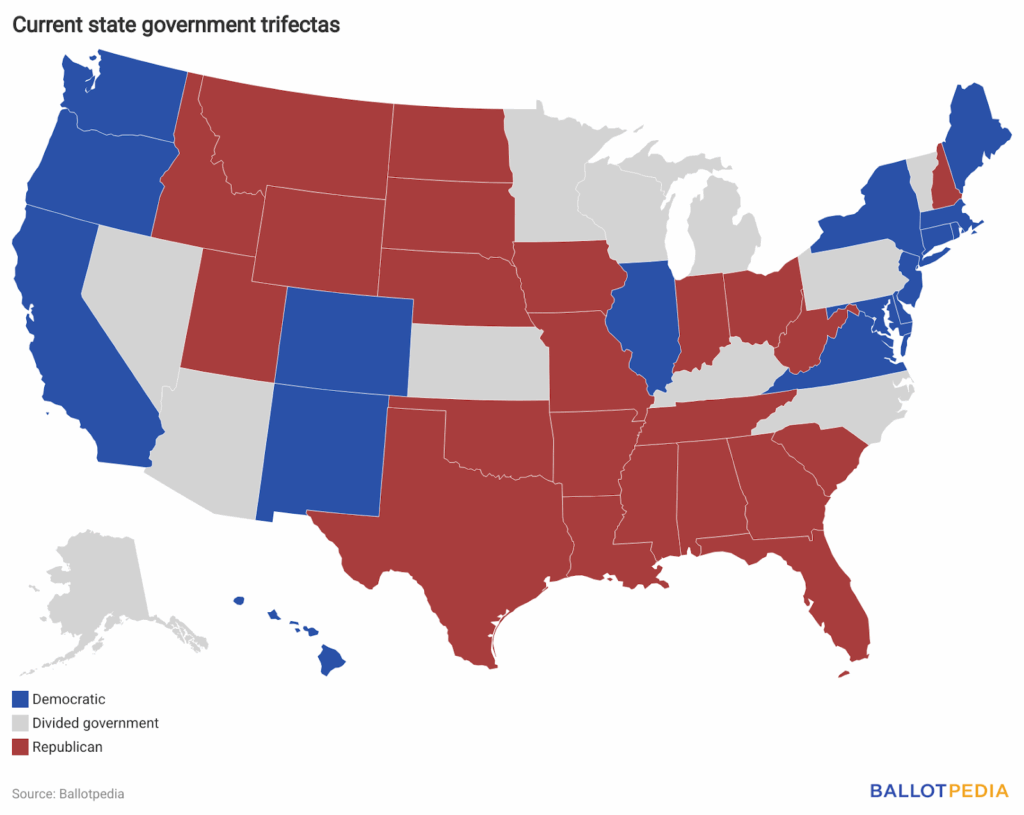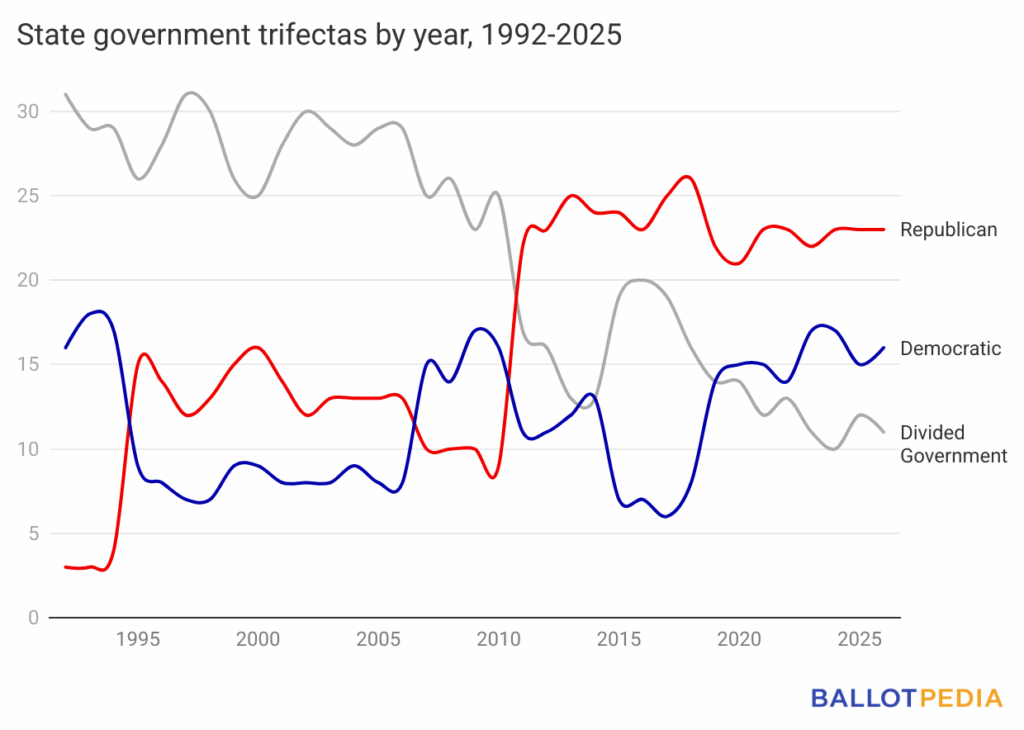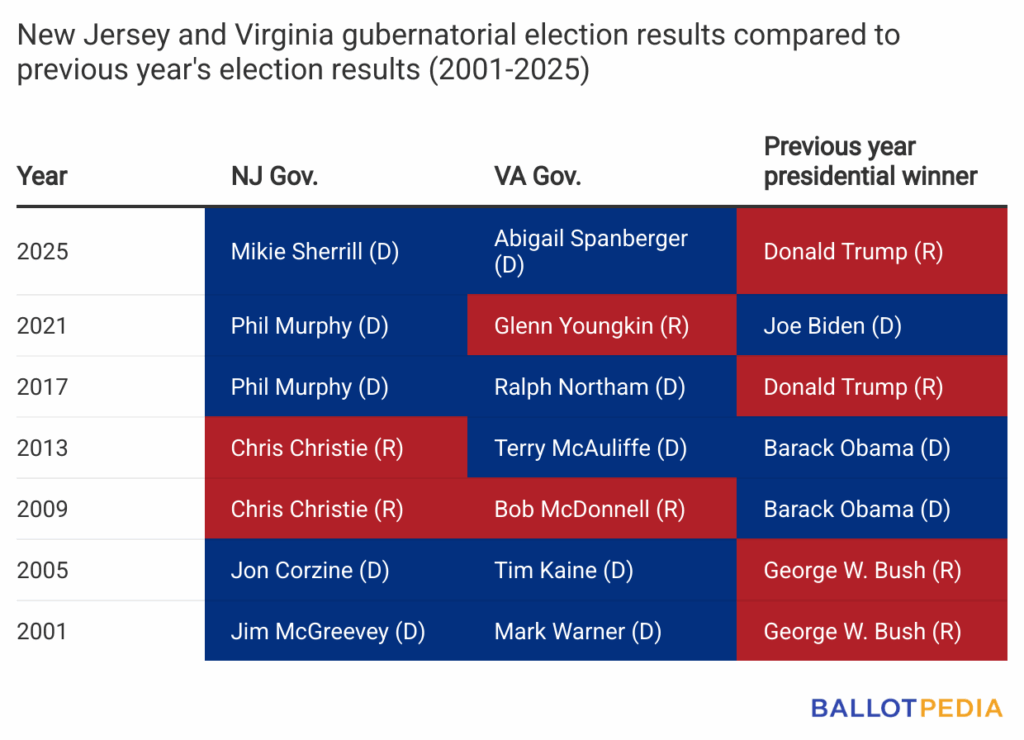Welcome to the Wednesday, Nov. 5, 2025, Brew.
By: Lara Bonatesta
Good morning, Brew readers! Twenty-nine states held more than 800 elections yesterday within our coverage scope, and while votes are still being tallied for many races, here’s a look at where things stood in some of this year's biggest elections as of 1 a.m. EST on Nov. 5.
For more election results coverage and to stay up to date in the coming days, check out our election results overview page.
Here’s a rundown on races we’re covering:
- Statewide election results
- State legislative elections
- Noteworthy local elections
- Noteworthy ballot measures and California Proposition 50
- Congressional special elections
State elections
Virginia
Abigail Spanberger (D) defeated Winsome Earle-Sears (R) in the race to succeed incumbent Gov. Glenn Youngkin (R), who was term-limited. As of 1 a.m. EST, with more than 95% of votes in, Spanberger received 57.5% to Earle-Sears’ 42.3%
Spanberger’s victory, combined with Democrats holding their majority in the House of Delegates, created a new Democratic trifecta in the state. Once Spanberger is sworn in, Virginia will be one of 16 Democratic trifectas. Nationally, following the 2025 elections, there will be 16 Democratic trifectas, 23 Republican trifectas, and 11 divided governments.


This race was the third consecutive Virginia gubernatorial election in which voters elected a candidate of the opposite political party as the current U.S. president. In 2017, Ralph Northam (D) defeated Ed Gillespie (R) and Cliff Hyra (L) 53.9%-45%-1.2% while Donald Trump (R) was president. In 2021, Glenn Youngkin (R) defeated Terry McAuliffe (D) and Princess Blanding (L) 50.6%-48.6%-0.7% while Joe Biden (D) was president.

Ghazala Hashmi (D) defeated John Reid (R) in the general election for lieutenant governor of Virginia. Incumbent Lt. Gov. Winsome Earle-Sears (R) ran for governor. As of 1 a.m. EST, with more than 95% of the vote in, Hashmi received 55.6% and Reid received 44.4%.
Virginia’s Lieutenant Governor presides over its state Senate. Currently, Democrats have a 21-19 majority in the Virginia Senate.
Jay Jones (D) defeated incumbent Jason Miyares (R) in the general election for Virginia Attorney General. As of 1 a.m. EST, with more than 95% of the vote in, Jones received 53.2% and Miyares received 46.8%.
In 2021, Miyares defeated then-incumbent Mark Herring (D) 50.4%-49.6%
The last time Virginians elected a governor and attorney general of different parties was in 2005, when Tim Kaine (D) was elected governor and Bob McDonnell (R) was elected attorney general.
Alongside Spanberger’s victory, Jones’ win means Democrats will have a triplex in Virginia (Spanberger will appoint the next Secretary of the Commonwealth). When all the new officials are sworn in, Virginia will be one of 21 Democratic triplexes.
Democrats increased their majority in the Virginia House of Delegates, gaining at least 13 seats to move from a 51-48 to a 64-36 majority. All 13 seats changed from Republican to Democrat. All 100 seats of the Virginia House were up for election, and heading into the election, Democrats had a 51-49 majority.
Twelve incumbents, all Republicans, lost. This was the most since 2017, when Democrats gained 15 seats and won a 51-49 majority. Heading into those elections, Republicans had a 66-34 majority.
Two incumbents lost in the 2023 elections, one Republican and one minor party or independent officeholder. Seven lost in 2021—all Democrats. At least one House incumbent lost in every general election since 2011, except in 2015.
Heading into the election, the House had changed party hands in every election since 2019.
New Jersey
New Jersey Governor and Lieutenant Governor (Elected on a joint ticket)
Mikie Sherrill (D) defeated Jack Ciattarelli (R) and two other candidates in the race to succeed incumbent Gov. Phil Murphy (D), who was term-limited. As of 1 a.m. EST, with 92% of votes in, Sherrill received 56.2% to Ciattarelli’s 43.2%.
On the same ticket, voters elected Dale Caldwell (D) lieutenant governor.
This was the first time either political party has won a third consecutive term as governor of New Jersey since Richard Hughes (D) succeeded two-term Gov. Robert Meyner (D) in 1961.
Combined with results in the New Jersey General Assembly, New Jersey will remain one of 16 Democratic trifectas. Since the governor also appoints both the attorney general and secretary of state, New Jersey will also remain one of 21 Democratic triplexes.
Democrats retained control of the New Jersey General Assembly. As of 1:00 a.m. EST, the New York Times had called 49 seats for Democrats and 19 for Republicans. No seats had changed party hands, no incumbents had lost, and 12 races remained uncalled. All 80 seats of the New Jersey General Assembly were up for election. Heading into the election, Democrats had a 52-28 majority.
At least one incumbent has lost in every general election since 2017. In the two most recent election cycles, six lost in 2023 and seven lost in 2021.
Heading into the election, Democrats had controlled both chambers of the Legislature since 2004.
Pennsylvania
Voters retained three justices—Christine Donohue (D), Kevin M. Dougherty (D), and David N. Wecht (D)— on the seven-member court.
As of 1 a.m. EST:
- Donohue was retained 61.4%-38.6% with 78% of precincts reporting
- Dougherty was retained 61.4%%-38.6% with 78% of precincts reporting
- Wecht was retained 61.1%-38.9% with 89% of precincts reporting
Heading into the elections, Democrats had a 5-2 majority on the Court. The Court has been under Democratic control since 2015. Since retention elections were established in 1968, only one Pennsylvania justice, Russell Nigro (D) in 2005, has not been retained.
Since 1990, a total of 327 state supreme court justices nationwide have faced 575 retention elections. Voters retained 318 justices and voted nine out, for a retention rate of 97.2%.
Georgia
Georgia Public Service Commission
Democrats gained two seats on Georgia's Public Service Commission, as Democrats Alicia Johnson and Peter Hubbard defeated incumbents Tim Echols (R) and Fitz Johnson (R) in the special elections for Georgia Public Service Commission. The commission will change from a 5-0 to a 3-2 Republican majority.
Here’s where the results stood as of 1 a.m. EST:
- In District 2, Alicia Johnson defeated Echols 61.9%-38.1%
- In District 3, Hubbard defeated Fitz Johnson 62.1%-37.9%
This was the first election for Georgia’s Public Service Commission in three years, following lawsuits over the use of districts for statewide voting.
According to the DNC, Johnson and Hubbard are the first Democrats to win a non-federal statewide election in Georgia in nearly 20 years.
The Georgia Public Service Commission regulates the state's utility services, such as electricity, phones, and gas. While the position is elected statewide, candidates must live in the district they are running in.
Mississippi
Democrats gained two Senate seats and one House seat across 10 special elections, eight in the Senate and two in the House. Six of the Senate elections and one of the House elections were the result of redistricting. The state passed new state legislative maps after a three-judge district court panel ruled in July 2024 that the previous maps did not contain enough majority-Black districts.
Democrats’ gains under the new map broke the Republican supermajority in the Senate. Heading into the elections, Republicans held 36 out of 52 Senate seats, one more than the minimum of 35 required to meet the two-thirds threshold. After the elections, Republicans hold 34 seats.
Notable local elections
Nineteen of the 100 largest cities held mayoral elections, and as of 12:45 a.m., with six races uncalled, none resulted in a partisan change. Seventeen of those cities had Democratic mayors pre-election and two had Republican mayors.
Zohran Mamdani (D) defeated Andrew Cuomo (I), Curtis Sliwa (R) in the race to succeed incumbent Mayor Eric Adams (D), who suspended his campaign. As of 1 a.m., with 91% of votes in, Mamdani received 50.4%, Cuomo received 41.6%, and Sliwa received 7.1%.
In the primary, Mamdani defeated Cuomo 56%-44% in the third round of ranked-choice voting (RCV). Both candidates advanced to the general election because in New York, candidates can run on multiple party lines.
This election highlighted splits in the larger Democratic Party. Mamdani is a state assembly member who describes himself as a democratic socialist, and Cuomo is the former governor of New York who describes himself as a moderate. Sliwa is a Republican and the founder of Guardian Angels, an organization focused on combating street crime.
Here are some other key mayoral battleground results:
- Albuquerque, New Mexico: Incumbent Tim Keller and Darren White advanced from the nonpartisan election to a runoff election on Dec. 9. As of 1 a.m. EST, Keller received 36.6% and White received 31.3%.
- Detroit, Michigan: Mary Sheffield defeated Solomon Kinloch 76.8%-22.7%. This was Detroit’s first open mayoral race since incumbent Mike Duggan was elected in 2013.
- Miami, Florida: Eileen Higgins and Emilio Gonzalez advanced from the nonpartisan election to a runoff election on Dec. 9. As of 1 a.m. EST, Higgins received 36% and Gonzalez received 19.5%
- Minneapolis, Minnesota: As of 1 a.m. EST with 99% of precincts reporting, incumbent Mayor Jacob Frey led with 41.7% of the vote to Omar Fateh’s 31.7%. Thirteen other candidates ran in the nonpartisan general election.
- Seattle, Washington: As of 12:00 a.m. EST, incumbent Bruce Harrell had 53.6% and Katie Wilson had 46.4%. In the nonpartisan primary election, Wilson won 51% of the vote and Harrell won 41% out of eight candidates. The last incumbent Seattle mayor to win re-election was Greg Nickels in 2005.
California Proposition 50 and other noteworthy ballot measures
California voters approved Proposition 50, authorizing the state to use a new, Legislature-drawn congressional district map for the 2026 through 2030 congressional elections. As of 1 a.m. EST, the vote was 64.2%-35.8%, with 68% of votes in.
California is the fifth state to redraw its congressional districts ahead of the 2026 elections. The new map makes five districts more favorable to Democrats according to 2024 presidential results. That could lower the net gains from redistricting in Republican-led states from nine districts to four nationwide.
The Citizens Redistricting Commission would redraw congressional districts in 2031, following the 2030 U.S. census.
Prop. 50 recently became the fourth-most expensive ballot measure in the state’s history.
Other ballot measures included:
- In Maine, voters defeated Question 1 61.2%-38.8%, which would have required voters to present photo identification for both in-person and absentee voting. Between 2004 and 2025, voters in 12 states decided on 13 ballot measures related to voter ID, with 10 (77%) approved. Maine Question 1 is unique among these measures because it proposed changing absentee voting and ballot drop box rules, in addition to requiring voter ID.
- Maine voters approved Question 2 60.4%-39.5%, establishing a process for obtaining an Extreme Risk Protection Order (ERPO). Maine is the 22nd state to authorize courts to issue ERPOs. Six states have laws that prevent or restrict the adoption of ERPOs.
- In Colorado, voters approved Propositions LL and MM 63.9%-36.1% and 57.3%-42.7%, respectively. Both measures relate to the state's Healthy School Meals for All Program (HSMA), which reimburses public schools for providing free breakfast and lunch to students.
- In Texas, voters approved all 17 constitutional amendments that the Legislature put on the ballot. Notable measures included:
- Proposition 3 provides additional circumstances under which individuals accused of certain crimes can be denied bail by a judge or magistrate
- Proposition 15 provides that parents have the right "to exercise care, custody, and control of the parent's child, including the right to make decisions concerning the child's upbringing" and the responsibility "to nurture and protect the parent's child." While 26 states have adopted Parents’ Bills of Rights, which are laws that grant parents specific rights regarding their children's education, none have adopted state constitutional amendments addressing the broader subject of parental rights.
- Proposition 16, which amends the state constitution to say that "persons who are not citizens of the United States" can not vote in elections in Texas. Current state law requires that residents must attest to being a citizen when registering to vote. Because Proposition 16 is an amendment, any future changes would require an additional constitutional amendment. Currently, no state constitution explicitly allows for noncitizen voting in state or local elections, and 17 states explicitly prohibit it.
- Propositions 2, 6, and 8, which prohibit certain types of taxes.
- In New York City, voters defeated New York City Question 6 53.1%-46.9%. It would have changed city elections from odd-numbered years to even-numbered years, coinciding with federal presidential election years.
- New York City voters also approved Questions 2, 3, and 4. All three measures were approved with more than 55% of the vote.
- Question 2 would create two new expedited review processes for publicly financed affordable housing projects.
- Question 3 would create an expedited review process, called the Expedited Land Use Review Procedure (ELURP), for land use changes for certain housing, affordable housing, and infrastructure projects.
- Question 4 would create the Affordable Housing Appeals Board (AHAB), which would have the power to overturn City Council decisions that reject affordable housing projects.
Congressional special election
Texas’ 18th Congressional District
Christian Menefee (D) and Amanda Edwards (D) advanced to a special election runoff from a field of 16 candidates. As of 1:00 a.m., with 66% of votes in, Menefee had 30.2% of the vote and Edwards had 25.8%. The runoff date has not yet been announced. The winner of this election will be the fourth person to represent the district since 2024 and will serve the remainder of former Rep. Sylvester Turner's (D) term through January 2027.
As of Nov. 3, Republicans had a 219-213 U.S. House majority with three vacancies.
The Texas Legislature voted to redraw the state's congressional district boundaries, including those of the 18th District, in August 2025. Governor Greg Abbott (R) signed the new map into law on Aug. 29, 2025. The special election took place within the boundaries of the old district. Voters will first vote under the new district boundaries in the March 2026 primary. Click here to learn more about redistricting in Texas ahead of the 2026 elections.


